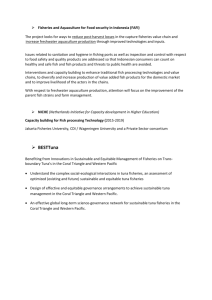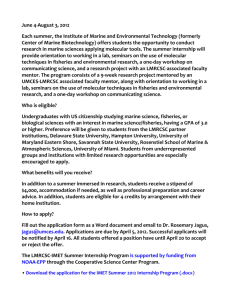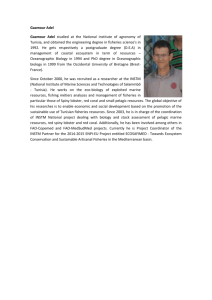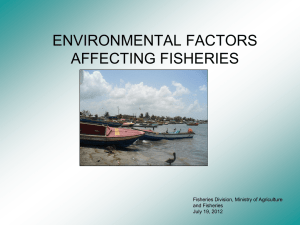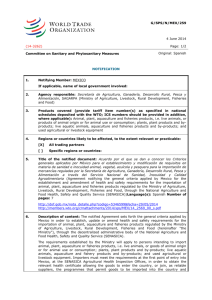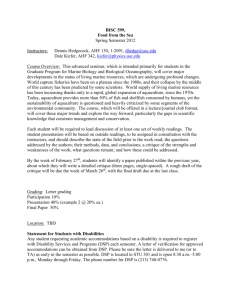Oceanography 331
advertisement
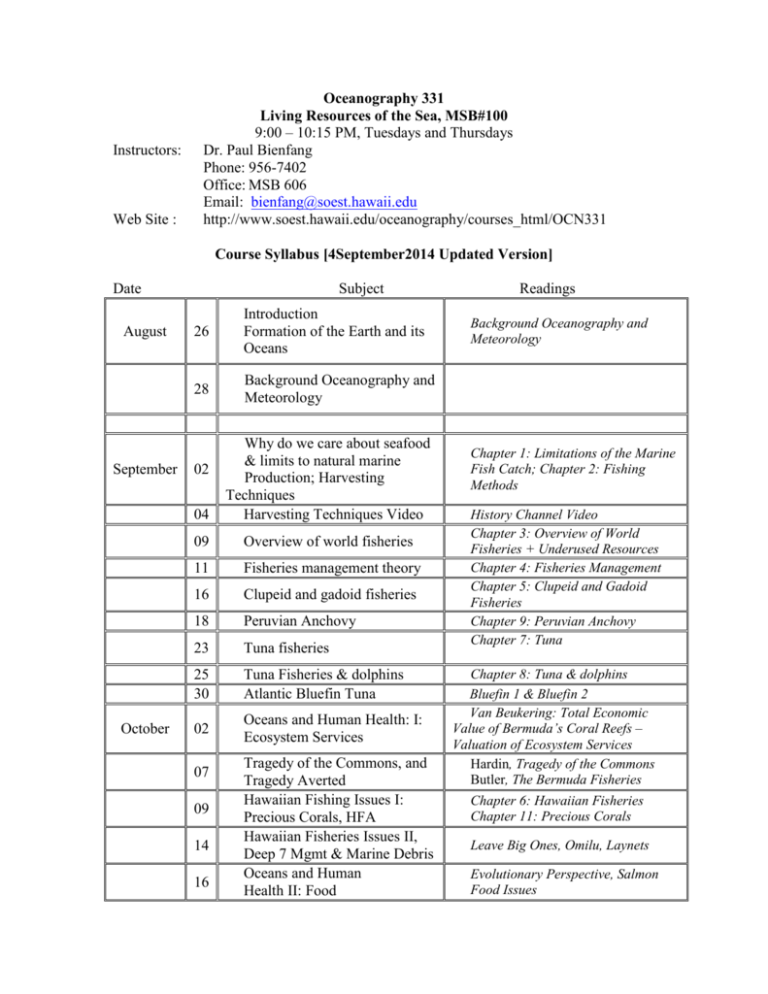
Instructors: Web Site : Oceanography 331 Living Resources of the Sea, MSB#100 9:00 – 10:15 PM, Tuesdays and Thursdays Dr. Paul Bienfang Phone: 956-7402 Office: MSB 606 Email: bienfang@soest.hawaii.edu http://www.soest.hawaii.edu/oceanography/courses_html/OCN331 Course Syllabus [4September2014 Updated Version] Date August September October Subject 26 Introduction Formation of the Earth and its Oceans 28 Background Oceanography and Meteorology 04 Why do we care about seafood & limits to natural marine Production; Harvesting Techniques Harvesting Techniques Video 09 Overview of world fisheries 11 Fisheries management theory 16 Clupeid and gadoid fisheries 18 Peruvian Anchovy 23 Tuna fisheries 25 30 Tuna Fisheries & dolphins Atlantic Bluefin Tuna 02 Oceans and Human Health: I: Ecosystem Services 02 07 09 14 16 Tragedy of the Commons, and Tragedy Averted Hawaiian Fishing Issues I: Precious Corals, HFA Hawaiian Fisheries Issues II, Deep 7 Mgmt & Marine Debris Oceans and Human Health II: Food Readings Background Oceanography and Meteorology Chapter 1: Limitations of the Marine Fish Catch; Chapter 2: Fishing Methods History Channel Video Chapter 3: Overview of World Fisheries + Underused Resources Chapter 4: Fisheries Management Chapter 5: Clupeid and Gadoid Fisheries Chapter 9: Peruvian Anchovy Chapter 7: Tuna Chapter 8: Tuna & dolphins Bluefin 1 & Bluefin 2 Van Beukering: Total Economic Value of Bermuda’s Coral Reefs – Valuation of Ecosystem Services Hardin, Tragedy of the Commons Butler, The Bermuda Fisheries Chapter 6: Hawaiian Fisheries Chapter 11: Precious Corals Leave Big Ones, Omilu, Laynets Evolutionary Perspective, Salmon Food Issues November 21 23 28 Review for Mid-Term Exam NO CLASS Mid-Term Exam Personal Review for Mid-Term Exam 30 Hawaiian Fisheries Issues III Fishing the Ancient Waters Status US Fisheries-PKB Video 4 Holiday –Election Day 6 Whales and Whaling I 11 Holiday – Veteran’s Day Oceans and Human Health III & I: Marine Models Pharmaceuticals and other non-food products Aquaculture – Principles, Potential and Overview Aquaculture - International Aquaculture - U.S. & Hawaii No Class – Thanksgiving 13 18 20 25 27 December 02 04 09 11 18 Aquaculture - Issues Law of the Sea Policy: Living Marine Resources, Intellectual Property Review for final exam Final examination Chapter 10: Whales and Whaling; Palumbi Articles Olivera Articles; Willis, Nature’s Pharma S Dietary Guidelines-Facts Seafood Nutrition-Facts Chapter 12: Aquaculture Chapter 13: Law of the Sea Your grade in the course is based on quizzes (30%), a mid-term exam (30%), and a final exam (40%). The final exam will be cumulative. Your grade on the quizzes will be based on your N-1 best quiz scores. Quizzes will be unannounced. Student Learning Outcomes: Students should understand the functioning of marine food web processes that produce commercially important fisheries in various oceanic realms, and reasons for limitations to fisheries catches. Students should understand the evolution of fishery technology and its impacts to various commercially important fisheries throughout the world. Students should understand the basic principals of fisheries management, and the practical and theoretical problems in their application. Students should understand the changing importance of aquaculture globally in the supplying seafood to the increasing demand. Students will be conversant with the history of fisheries and aquaculture in Hawaii, the United States, and globally. Students will be familiar with case studies of marine biodiscovery, and examples of influences of the oceans and fisheries products on the health of humans.

